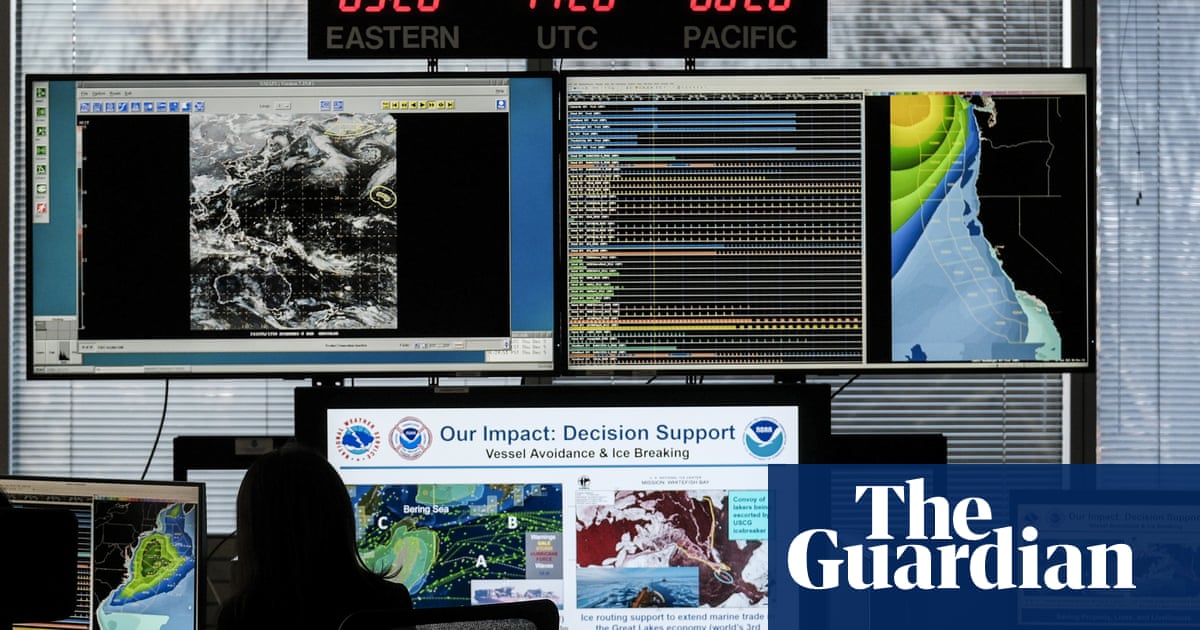The National Oceanic and Atmospheric Administration (Noaa) will no longer track the cost ofclimate crisis-fueled weatherdisasters, including floods, heatwaves, wildfires and more. It is the latest example of changes to the agency and theTrump administrationlimiting federal government resources on climate change.
Noaa falls under the US Department of Commerce and is tasked with daily weather forecasts, severe storm warnings and climate monitoring. It is also parent to the National Weather Service.
The agency said its National Centers for Environmental Information would no longer update its Billion-Dollar Weather and Climate Disasters database beyond 2024, and that its information – going as far back as 1980 – would be archived.
For decades, it has tracked hundreds of major events across the country, including destructive hurricanes, hailstorms, droughts and freezes that have totaled trillions of dollars in damage.
The database uniquely pulls information from the Federal Emergency Management Agency’s (Fema) assistance data, insurance organizations, state agencies and more to estimate overall losses from individual disasters.
Noaa’s communications director, Kim Doster, said in a statement that the change was “in alignment with evolving priorities, statutory mandates, and staffing changes”.
In a separate development on Thursday, Fema’s acting administrator, Cameron Hamilton,was pushed outand replaced by another official from the Department of Homeland Security, a day after he testified on Capitol Hill that he did not agree with proposals to dismantle Fema, whichDonald Trumphasthreatenedto do.
Scientists say extreme weather events are becoming increasingly more frequent, costly and severe with the climate crisis. Experts have attributed the growing intensity ofrecent debilitating heat,Hurricane Milton, the southernCalifornia wildfiresandblasts of coldto the climate crisis.
Assessing the impact of weather events fueled by the planet’s warming is key as insurance premiums rise, particularly in communities more prone to flooding, storms and fires. The climate crisis haswreaked havoc on the insurance industry, and homeowners are at risk of soaring rates.
One limitation is that the dataset estimated only the nation’s most costly weather events.
The information is generally seen as standardized and unduplicable, given the agency’s access to non-public data, and other private databases would be more limited in scope and likely not shared as widespread for proprietary reasons. Other datasets, however, also track death estimates from these disasters.
Jeff Masters, a meteorologist for Yale Climate Connections, pointed to substitutes from insurance brokers and the international disaster database as alternative sources of information.
Still, “the Noaa database is the gold standard we use to evaluate the costs of extreme weather,” Masters said, “and it’s a major loss, since it comes at a time when we need to better understand how much climate change is increasing disaster losses.”
These moves also do not “change the fact that these disasters are escalating year over year”, Kristina Dahl, the vice-president of science at non-profit climate organization Climate Central. “Extreme weather events that cause a lot of damage are one of the primary ways that the public sees that climate change is happening and is affecting people.
“It’s critical that we highlight those events when they’re happening,” she added. “All of these changes will make Americans less safe in the face of climate change.”
The move, reported on Thursday by CNN, is yet another of Trump’sefforts toremovereferencesto the climate crisis and the impact of greenhouse gas emissions on the weather from the federal government’s lexicon and documents.
The presidenthas instead prioritized alliesin the polluting coal, oil and gas industries, which studies say are linked or traced to climate damage.
The Trump administrationfired hundredsof weather forecasters and other federal Noaa employees on probationary status in February, part of Elon Musk’s unofficial “department of government efficiency” efforts to downsize the federal government workforce. It began asecond roundof more than 1,000cutsat the agency in March, more than 10% of its workforce at the time.
At the time, insiders said mass firings and changes to the agency would risk lives and negatively affect the US economy. Experts also noted fewer vital weather balloon launches under Noaa would worsen US weather forecasts.
More changes to the agency are expected, which could include some of those proposed in the president’s preliminary budget.
The agency’s weather service also paused providing language translations of its products last month – though it resumed those translations just weeks later.
